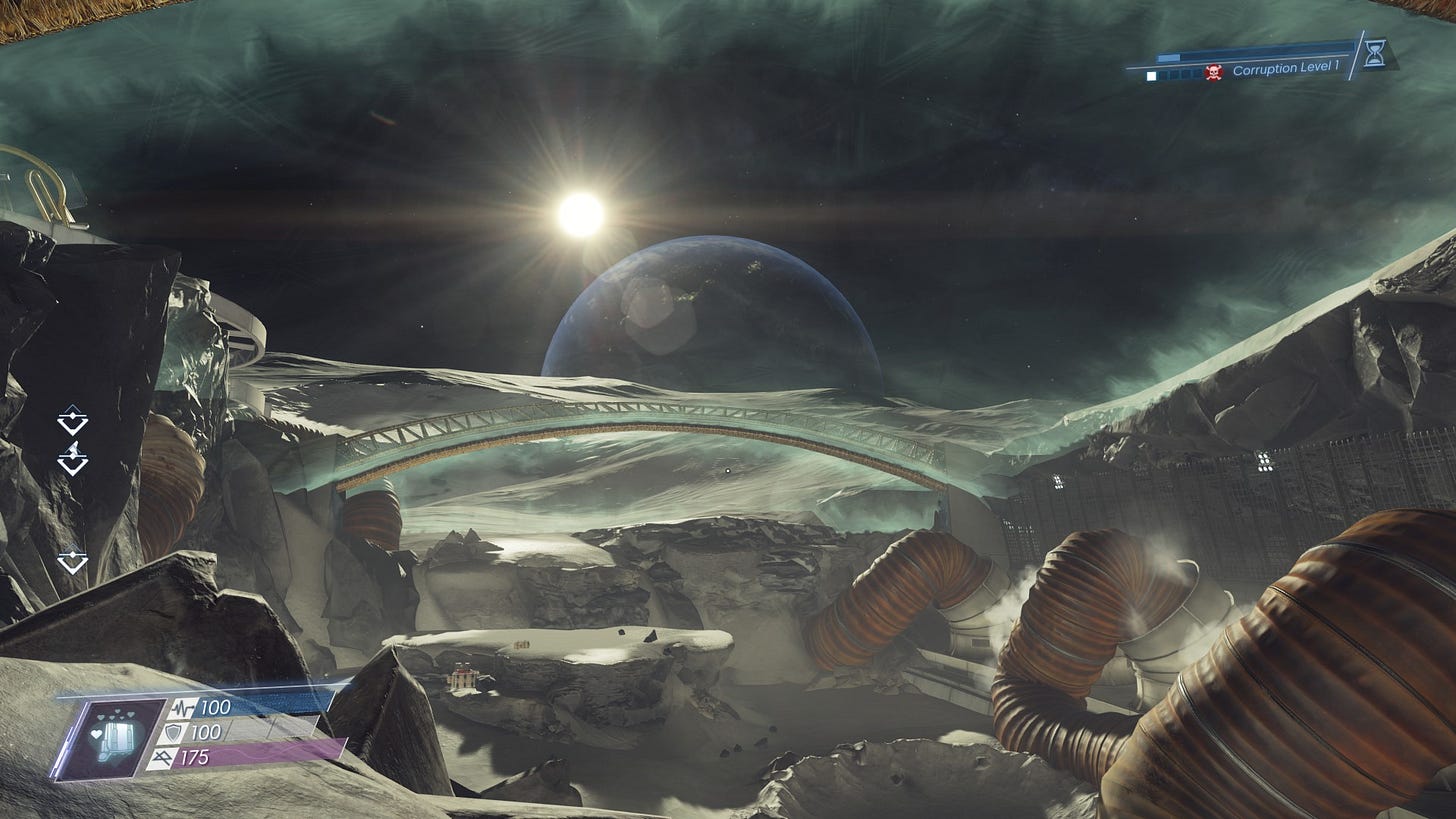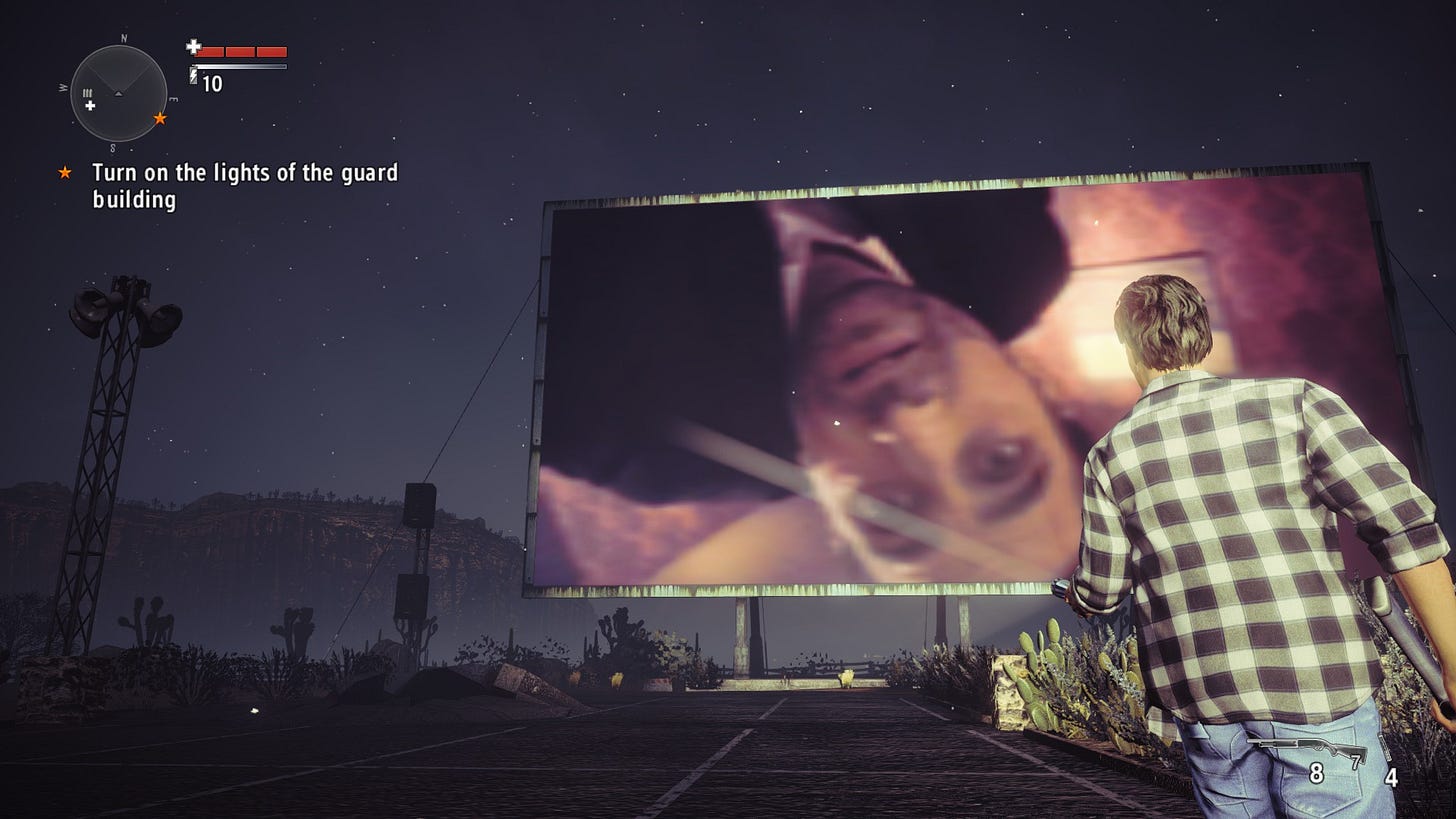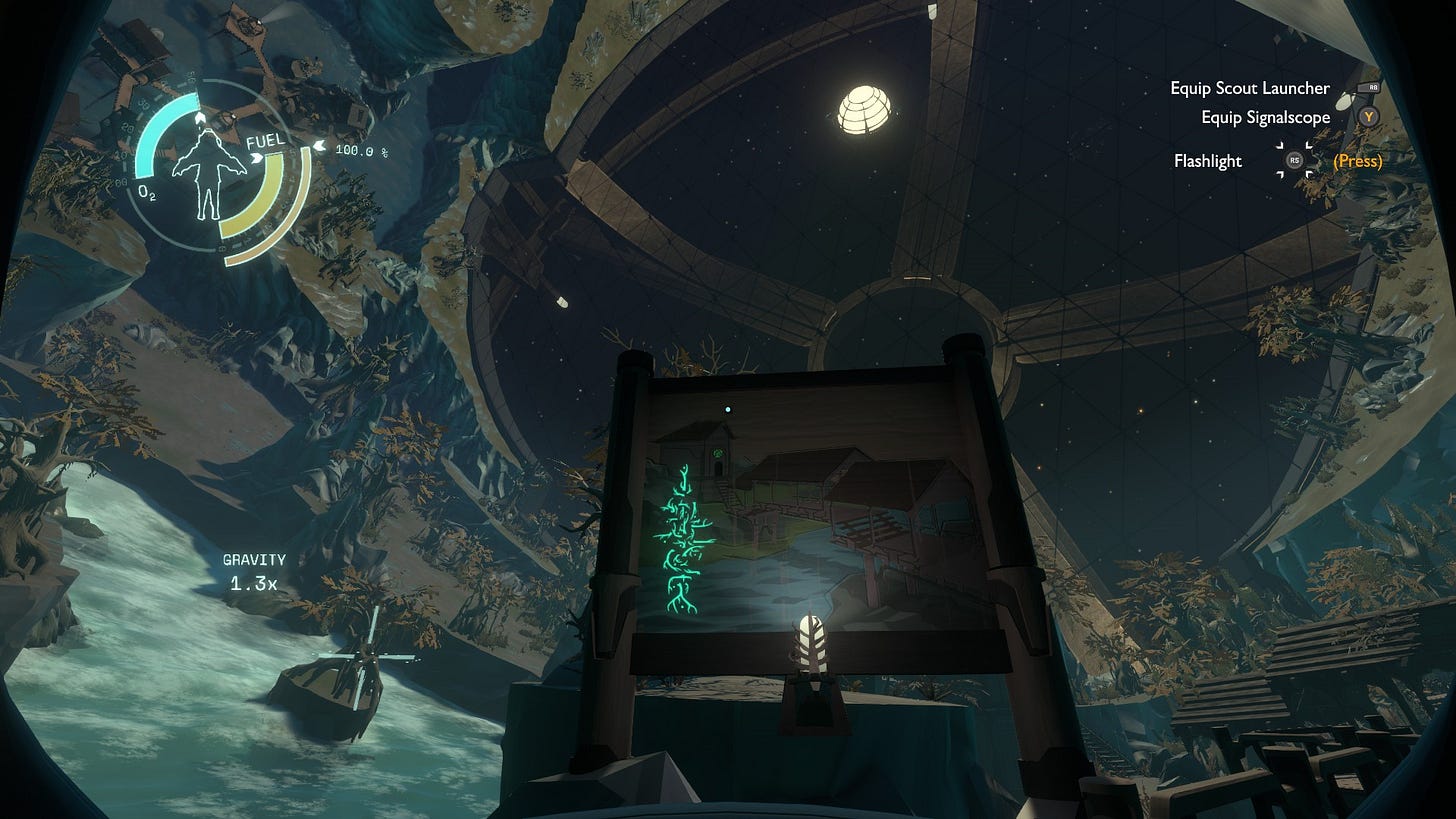Loop 29: Mooncrash / American Nightmare / Echoes of the Eye
In Which We Enter Our Forward Slash Era
I’m playing a dangerous game the more stuff I try to fit into a single post. The lead time I need to play three whole video games is very significant (still haven’t completed Echoes as of this writing). By the time I sit down and put finger to keyboard, I sometimes find I’ve forgotten most of what I wanted to say. Who knows, maybe that’ll be an improvement? Anyway, this time I played three games which are all downloadable content (DLC) AKA expansion packs (ExPacs1) AKA sorta sequels to games that aren’t really big enough to be considered a real sequel so they cost less. Which, as far as distinctions to base a theme of a post on go, feels very flimsy when you type it out. Spoilers abound!
Prey is a first person immersive sim2 where you’re stuck on a massive corporate satellite with aliens, called Typhon, with psychic powers that can take the shape of ordinary objects. There’s a lot of other stuff going on, but that’s the gist. You are trying to escape and/or destroy the entire alien threat. It’s one of my favorite games of the past ten years and while I could go on an on about what’s great about it, it’s not what I’m talking about.
Prey: Mooncrash is an expansion pass which puts you in the shoes of a corporate spy, orbiting a rival company’s moon base. When the base completely collapses due to a Typhon infestation you’re tasked with entering a simulation of the base as seen through five people’s neural memories. So this memory simulation thing becomes the basis for the loop and you repeat the simulation from these five perspectives until you’ve done everything your corporate overlord requires.
This should not work. Prey takes place on a massive space station where you spending tons of time levelling up your character’s abilities and equipment and generally investing a lot of time and energy. To take that and plop into a roguelike (death, repetition, randomization) feels very counter intuitive. But it does work, oddly, because Arkane have managed to fit all their hooks into that framework. Every run offers the chance to upgrade the character you’re playing at the time, as well as to earn points to invest in your next run. There are a collection of corporate objectives to accomplish over all your loops to beat the game. Each character has a personal story quest to go on.
I’m not sure there’s an obvious magic reason why it all works so well other than it’s just so clearly thought through. Progression feels meaningful and death/repetition feels inevitable and not wasteful. It just feels right. Anyway, the ultimate endpoint of the game is to play through five successive moon escapes with all five characters without resetting the simulation. Time progresses between these runs and the difficulty ratchets up, so if you find yourself taking too long with the janitor on the first run, you may struggle to survive by the time you’re escaping with the executive in the fifth.
I was very taken with the whole experience, which shouldn’t be too surprising since I so loved Prey. If I were to lodge one complaint, it’d be that the moon base is perhaps just a touch smaller than it should be. While intimidating at first, by loop 70 or whatever I felt like I had seen it all a bit too much. But that’s just me being greedy. The looping is both narratively interesting and mechanically engaging. Simulations should feel inherently meaningless, but contextualizing them as memories totally solves that. It’s worth noting that there’s a whole narrative, that’s good, surrounding the guy in space doing these simulations, but no reason to needlessly spoil every possible thing.
Alan Wake is a difficult beast to describe. It’s a 3rd person, story heavy, action-ish horror-ish game. You play as Alan Wake, a Stephen King type, who goes to not-Twin Peaks for vacation, only to find that his wife is missing, he’s lost his memory, and shadow zombie dudes are everywhere. Describing the plot beyond this gets tricky, not the least because it’s been a minute since I’ve played it. Suffice to say, Alan has some sort of power to literally rewrite reality that some horrible dark cosmic entity is trying to compel him to use for big evil stuff. Spoilers, he beats the bad dark entity.
American Nightmare picks up some time later, where Alan has been apparently trapped in some version of a southwest town called Night Springs3 that seems to really be some alternate dimension in a twisted form of our reality. Alan wants to leave and get back to his wife. Some evil doppleganger version of Alan has stolen his identity in the real world and has left tapes of himself being an asshole/psychopath in a hotel room. Alan has to use world rewriting powers to set things right.
To rewrite reality you have to go around and fix things so that they match the details of your manuscript pages. This usually involves running around for a while to get stuff or unlock a door, you talk to some lady who’s hanging out, then it’s a big fight, then you click some buttons and stuff. There’s three levels and they all play out this way. Once you’ve gotten through the third level, oops, it’s a time loop triggered by Evil You. You end up playing through these levels three times, but each time a significant amount of your tasks are reduced so it gets increasingly streamlined. Eventually you get through the loops fast enough the Evil You can’t reset time and he’s destroyed and you get back to the world. Yay.
You may sense a lack of enthusiasm here. I didn’t hate American Nightmare. The core gameplay and world of Alan Wake is fun enough that I didn’t mind spending a few hours there again, but it did feel a lot like #content. It’s hard to see the loops as anything but a method of very desperate and weak padding to justify making 3 levels instead of 9. There’s an evil you and you have to stop him by repeating three ordinary actions a few times is not exactly an exciting or engaging story. And all of this is further hampered by the dream logic-y nature of this and Alan Wake generally. What am I doing, in actual and literal terms? It’s hard to say. The game is framed as a Night Springs episode, complete with Rod Serling-esque narration, and he suggests it might all be his Alan’s imagination as the credits are about to roll.
The one noteworthy moment I’d call out is when Alan talks to the science lady from the second level, I believe in the final loop. These solitary characters are all realizing and adapting to the fact that loops are happening more and more as they go on. She initially confronts Alan as potentially being delusional, but then challenges him on the morality of his worldview where she and other “characters” in this fictional dimension are inevitably treated as props. It’s interesting ground that Alan Wake is ripe for digging into, but it’s little more than a minute long cutscene that Alan, sticking to his character, brushes off in order to focus on his mission. It seems like an interesting outgrowth of the choice to do loops specifically, but sadly it’s an outlier in what feels like somewhat of a cashgrab.
Outer Wilds is… wait, I don’t have to do this. Check out Loop 26! That’s convenient. Well, Echoes of the Eye is an expansion which provides a whole new world to explore within our familiar solar system. (For real now: SPOILERS. Discovery is all this game is, so the possibility of that is genuinely worrying to me.) A new exhibit takes you on a breadcrumb trail to uncover what is a truly remarkable little space station planet. When you look down at the Sun from just the right angle/time, you’ll see an eclipe where there is no planet. Approach and you find an invisble craft that seems to have been the home of an entire secret species.
It’s one of those big ol’ wheel space stations of old timey sci-fi futurism drawing fame! It’s got a nice rugged frontier vibe with a giant raging river. You navigate the river using a raft and stop at all the little habitats along the way. There’s a number of new puzzle systems, mostly based around light and darkness. Most of the story is conveyed through a neat slide projector system. What more is there to say? The planet is nice and I had a nice time on it.
(Update: After writing the above words, it took me a month to finish this. That’s partly because of struggling, partly because I just didn’t have/invest the time, and partly because I just thought it would be shorter than it was.)
I’m pretty floored by Echoes, having finished it just moments ago. It is a magic trick to take a such a big, special experience like Outer Wilds and then repackage it into a miniature form, do a bunch of pretty different things, and yet make it feel like it’s all of a piece and fits together. The story is lovely. It’s got VR and space madness and I will spoil no more. Just a bittersweet, touching tale, told elegantly. And the play experience is (mostly) as fantastic as the base game.
Okay, so about that mostly. My gripe is that what makes Outer Wilds work so well to me is it’s scale. There are so many little puzzles to solve, but they’re all so spread out across the universe that you can tinker away on one, hit a wall, and then go do something else. Meanwhile the back of your mind is churning on that wall and when you hit that planet again with fresh eyes you crack it easily.
Well, Echoes is much less open ended than that. There are a couple zones on the planet to crack into, but ultimately there are some linear chokepoints and I was having a miserable, annoying time with this when I wasn’t seeing my way through them. Having a time limited loop also feels a lot more punishing when it’s basically forcing you to immediately go back and repeat 90% of the exact same actions every time. I ended up looking at a guide and then kind of jumping way ahead of where I was meant to be and slightly regretted not having the “pure” experience. But these are ultimately small gripes about a tremendously rich game.
Coming up next time, I try to stay alive until dawn with an October double feature of… Lucky and The Final Girls!
jk
Translation: The camera is your head and the game has a bunch of deep systems that allow you to approach situations from a number of different ways. The archetypical example is that you’re trying to infiltrate a building. You can choose to talk your way in, pickpocket a key, climb up the building, hack the security system, sneak in through the sewers, or etc. etc.
Not super important, but Night Springs is also the name of a Twilight Zone type TV show that exists in Alan Wake which Alan mentions having written for. So this isn’t real reality… probably?






